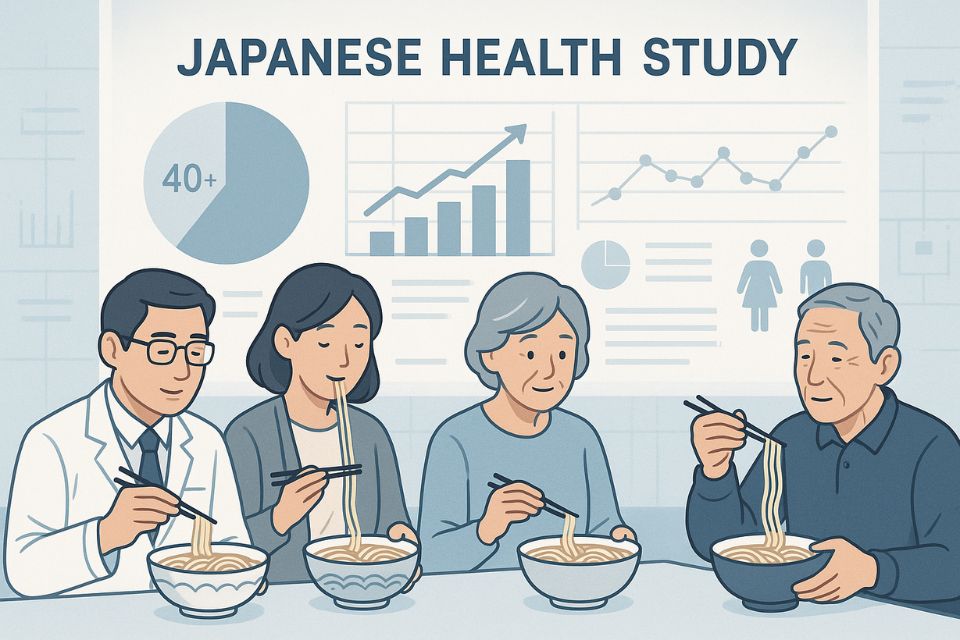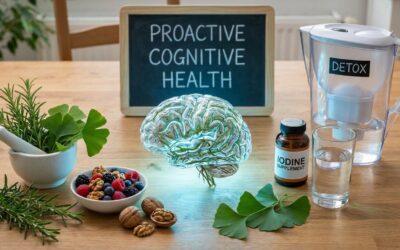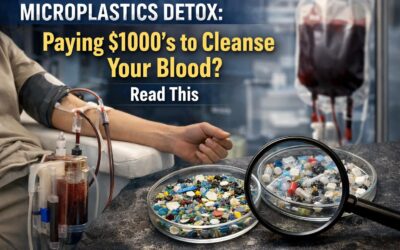A new epidemiological study out of Japan has caught attention by linking frequent ramen consumption with an increased risk of early mortality—especially in men under age 70 who drink a large proportion of the salty broth or consume alcohol. While the authors emphasize that the work is observational and cannot definitively prove causation, it does highlight an important truth: highly processed, sodium-heavy foods like ramen, commonly referred to as ultra-processed foods, can accelerate health decline.
The good news? With better salt choices and targeted nutritional strategies—including Accelerated Ancient Salt®, Acceleradine® Iodine, Accelerated Liver Care®, and Accelerated Cellular Detox® Powder—you can protect your health and even buffer some of the risks when transitioning away from processed foods.
Key Findings from the Ramen Study
- The study tracked ~6,725 Japanese adults aged 40+ for about 4.5 years.
- Frequent ramen consumers were typically men, younger, with higher BMI, and more likely to smoke and drink.
- During follow-up, there were 145 deaths (100 from cancer, 29 from cardiovascular causes).
- Eating ramen ≥3 times per week showed a trend toward increased mortality risk (though not statistically significant overall).
- In subgroup analysis, risks were significantly higher for:
- Men under 70 who consumed more than half the broth.
- Individuals who combined frequent ramen and alcohol.
- The authors note limitations such as self-reported diet and lifestyle factors, but the signal is clear: ramen-heavy diets may reflect—and contribute to—patterns of poor nutrition, particularly diets high in ultra-processed foods. High consumption of processed and red meat has also been linked to increased risks of health conditions such as bowel cancer, obesity, and heart disease, and ramen-heavy diets often displace healthier options, such as other foods that are less processed.
Introduction to the Risks of Ultra Processed Foods
It seems like everywhere you turn, your grocery cart fills up with the same convenient staples — those instant ramen noodles for busy nights, the bag of potato chips for weekend snacking, the packaged treats that make life just a little easier. These ultra processed foods have quietly become the backbone of our modern eating habits, offering that undeniable convenience and flavor we crave — but at a cost to your health that’s more serious than you might realize. When you dig into the research, you’ll discover that diets heavy in these processed foods are directly linked to an increased risk of chronic conditions like heart disease, high blood pressure, and even certain cancers. The real culprit? It’s what’s hiding inside: these foods are absolutely loaded with sodium, saturated fats, high fructose corn syrup, monosodium glutamate, and a parade of artificial food additives that can throw your body’s natural balance completely out of whack — leading to dangerous sodium overload, skyrocketing blood pressure, and putting you at serious risk for chronic kidney disease.
Here’s what the World Health Organization and leading dietary experts want you to know: you should be keeping your sodium (the refined table salt version) intake below 2,000 milligrams per day and limiting added sugars to less than 10% of your total calories. The frustrating truth is that ultra processed foods make it ridiculously easy for you to blow past these limits — especially when you consider just how much salt, corn syrup, and other additives are lurking in the everyday products sitting in your pantry right now. Over time, this eating pattern becomes like a slow assault on your human body, steadily increasing your risk of heart disease and other life-altering health problems. But here’s the empowering part: once you understand the real risks that come with processed foods and start making more mindful, intentional choices, you can absolutely take control of your health and dramatically reduce your risk of disease.
Why Ramen (and Processed Meals) Pose Risks
1. Refined Salt Overload
The broth is the most sodium-dense component. But this isn’t mineral-rich salt—it’s refined industrial salt (pure sodium chloride), typically sourced from salt mines and processed to remove impurities, which makes it different from unrefined salts. Often bleached and stripped of trace minerals, refined salt may also lack added iodine, and its absence can contribute to iodine deficiency, leading to health problems such as goiter and developmental issues. Over time, this creates electrolyte imbalances, burdens the kidneys, raises blood pressure, and stresses the cardiovascular system.
2. Inflammatory Oils and Additives
Flavor packets and toppings often include refined seed oils, hydrogenated fats, and MSG derivatives. These ingredients are substances approved for use in food products to enhance flavor and improve shelf life. They:
- Drive inflammation through unstable omega-6 oils.
- Increase oxidative stress and free radical damage.
- Spike blood sugar and insulin via refined flours.
- Dilute nutrient density, leaving the body starved of critical cofactors.
Why Unrefined Salt Makes a Difference
Not all salt is equal. Unrefined salts contain a broad spectrum of minerals that balance electrolytes and reduce the inflammatory burden. Traditionally, salting has been used as a method of food preservation and flavor enhancement, allowing for long-term storage and improved taste. When the World Health Organization talks about limiting your sodium intake, they aren’t talking about unrefined salt; in fact, most people are deficient of the broad spectrum of minerals found in unrefined salt.
Understanding Minimally Processed Foods
If you’re feeling like your energy is constantly drained or your body just isn’t responding the way it used to, the answer could be sitting right in your pantry. While ultra processed foods are quietly sabotaging your health from the inside out, minimally processed foods are like having a trusted ally in your corner, ready to help you build the vibrant, energetic life you deserve. Think about foods like whole fruit and brown rice—these nutritional powerhouses undergo little to no processing to keep you safe and make your life easier, while holding onto the natural nutrients your body is craving.
When you choose minimally processed foods, you’re not just eating—you’re taking control of your health in ways that can transform how you feel every single day. These foods are loaded with essential vitamins, minerals, and fiber that work like a well-oiled machine to support everything from smooth digestion to the kind of sustained energy that doesn’t crash at 3 PM. Plus, they’re naturally helping you manage sodium intake and blood pressure because they contain far less of that sneaky added refined salt and sugar that’s hiding in ultra-processed foods.
Reading Food Labels for Informed Choices

Learning to read food labels isn’t just a nice skill to have—it’s one of the most powerful weapons in your health arsenal. With shelves packed full of everything from ultra processed foods to minimally processed options, you absolutely need to know what you’re actually putting into your body.
Let’s start with the ingredient list—this is where the real story unfolds. You’ll want to keep your eyes peeled for troublemakers like high fructose corn syrup, sodium chloride (that’s just fancy talk for table salt), and those endless lists of food additives that sound like they belong in a chemistry lab. These culprits are everywhere—lurking in instant ramen noodles, potato chips, and countless other heavily processed products. Here’s a simple rule of thumb: the more ingredients you can’t pronounce, the more likely that food is ultra processed and stripped of real nutritional value.
Next up, study the Nutrition Facts panel. Pay serious attention to sodium intake, saturated fats, and those sneaky added sugars. The Dietary Guidelines aren’t just suggestions—they’re your roadmap to better health, recommending we keep added sugars under 10% of our total calories and sodium below 2,300 milligrams daily. Here’s what’s scary: high sodium intake (from refined salt) is directly linked to high blood pressure, cardiovascular disease, and chronic kidney disease, while excess inflammatory seed oils can send your cholesterol up and put your heart at risk.
The good news is that choosing smarter processed foods doesn’t have to be complicated. We can make better choices by seeking out options with lower sodium and saturated fat. Instead of reaching for canned fruits swimming in syrup, grab whole fruit (organic is best). And ditch those instant ramen packets and other ultra processed foods for minimally processed champions like brown rice, or other grains listed in the Accelerated Food Guide.
The truth is, by taking just a few extra moments to read food labels and truly understand what those ingredients mean, you’re giving yourself an incredible gift—the power to make choices that genuinely support your well-being. As the World Health Organization suggests aiming for less than 2,000 milligrams of refined sodium daily and limiting added sugars and saturated fats,they’re giving us a blueprint for better health. With mindful label reading and a sharp focus on real nutritional quality, you can absolutely enjoy a healthier diet and slash your risk of high blood pressure, heart disease, and countless other health conditions that processed foods love to trigger.
Supplement Strategies to Support Dietary Shifts
As you are phasing out the processed foods like Ramen, the supplements below can help increase energy and vitality so your cravings diminish as you move into a healthier dietary lifestyle.
1. Acceleradine® Iodine
- May help support thyroid hormone production, metabolism, and healthy energy levels.
- May assist the body in displacing toxic halogens such as fluoride, bromine, and chlorine that are found in processed foods and interfere with thyroid function.
- May work in synergy with Accelerated Ancient Salt® to promote detoxification and hydration and support overall cellular health.
2. Accelerated Liver Care®
- May help enhance bile flow and overall liver detox capacity as the toxins from processed foods and Ramen leave the body.
- Formulated with Milk Thistle, Bupleurum, Phyllanthus, TUDCA, and other botanicals that may support liver resilience and antioxidant protection.
- May support the thyroid-liver connection by helping the conversion of T4 (inactive hormone) into Free T3 (active hormone), which may help maintain optimal metabolism and energy.
3. Accelerated Cellular Detox® Powder
- A blend of Zeolite, Diatomaceous Earth, Activated Charcoal, Triphala, Slippery Elm, and Chitosan that may help bind and eliminate environmental toxins such as plastics, pesticides, and heavy metals.
- May help support gut health by reducing bloating, improving regularity, and preventing reabsorption of toxins.
- May contribute to overall cellular detoxification and digestive comfort.
4. Accelerated Ancient Salt®
- May help replenish the full spectrum of minerals lost through refined-salt consumption and modern diets.
- May support hydration, electrolyte balance, and natural detoxification processes.
- May help buffer the effects of processed-food sodium and promote energy production at the cellular level.
A Practical “Balanced Ramen”
- Limit ramen to 1–2 times per week or less. Avoid finishing the broth.
- Cook at home with clean ingredients, adding vegetables and wild protein. For umami flavor, season with gluten free soy sauce. Experiment with other flavors by trying different vegetables or seasonings to customize your ramen.
- Season with Accelerated Ancient Salt®, not refined table salt.
- Choose lean proteins such as bison or venison.
- Avoid ingredients with added sugar for a healthier ramen meal.
- Use detox support like Accelerated Liver Care® or Accelerated Cellular Detox® Powder after processed meals.
- Supplement iodine prudently with Acceleradine® Iodine.
- Hydrate with mineral-rich water and eat potassium-rich foods like avocado and leafy greens.
- Prioritize lifestyle practices: exercise, sleep, sauna, and stress management.
Final Takeaways
The ramen study underscores a key truth: diets heavy in processed foods, refined salt, and inflammatory oils take a toll on health. But the solution isn’t to avoid salt altogether—it’s to choose the right salt and give the body the tools it needs to thrive.
- Refined salt depletes.
- Accelerated Ancient Salt® restores.
When paired with Acceleradine® Iodine, Accelerated Liver Care®, and Accelerated Cellular Detox® Powder, you equip your body to handle modern dietary challenges, detox more effectively, and restore energy and vitality.
Sara Banta
Sara Banta is a Stanford University Graduate with a Degree in Economics and Psychology, and a certified Natural Supplement Expert & Graduate of the Institute for Integrative Nutrition. Sara is the Founder of Accelerated Health Products and host of the health & wellness podcast, Accelerated Health Radio.
- Sara Banta
- Sara Banta
- Sara Banta
- Sara Banta
- Sara Banta
- Sara Banta
- Sara Banta
- Sara Banta
- Sara Banta
- Sara Banta
- Sara Banta
- Sara Banta
- Sara Banta
- Sara Banta
- Sara Banta
- Sara Banta
- Sara Banta
- Sara Banta
- Sara Banta
- Sara Banta
- Sara Banta
- Sara Banta
- Sara Banta
- Sara Banta
- Sara Banta
- Sara Banta
- Sara Banta
- Sara Banta
- Sara Banta
- Sara Banta
- Sara Banta
- Sara Banta
- Sara Banta
- Sara Banta
- Sara Banta
- Sara Banta
- Sara Banta
- Sara Banta
- Sara Banta
- Sara Banta
- Sara Banta
- Sara Banta
- Sara Banta
- Sara Banta
- Sara Banta
- Sara Banta
- Sara Banta
- Sara Banta
- Sara Banta
- Sara Banta
- Sara Banta
- Sara Banta
- Sara Banta
- Sara Banta
- Sara Banta
- Sara Banta
- Sara Banta
- Sara Banta
- Sara Banta
- Sara Banta
- Sara Banta
- Sara Banta
- Sara Banta
- Sara Banta
- Sara Banta
- Sara Banta
- Sara Banta
- Sara Banta
- Sara Banta
- Sara Banta
- Sara Banta
- Sara Banta
- Sara Banta
- Sara Banta
- Sara Banta
- Sara Banta
- Sara Banta
- Sara Banta
- Sara Banta
- Sara Banta
- Sara Banta
- Sara Banta
- Sara Banta
- Sara Banta
- Sara Banta
- Sara Banta
- Sara Banta
- Sara Banta
- Sara Banta
- Sara Banta
- Sara Banta
- Sara Banta
- Sara Banta
- Sara Banta
- Sara Banta
- Sara Banta
- Sara Banta
- Sara Banta
- Sara Banta
- Sara Banta
- Sara Banta
- Sara Banta
- Sara Banta
- Sara Banta
- Sara Banta
- Sara Banta
- Sara Banta
- Sara Banta
- Sara Banta
- Sara Banta
- Sara Banta
- Sara Banta
- Sara Banta
- Sara Banta
- Sara Banta
- Sara Banta
- Sara Banta
- Sara Banta
- Sara Banta
- Sara Banta
- Sara Banta
- Sara Banta
- Sara Banta
- Sara Banta
- Sara Banta
- Sara Banta
- Sara Banta
- Sara Banta
- Sara Banta
- Sara Banta
- Sara Banta
- Sara Banta
- Sara Banta
- Sara Banta
- Sara Banta
- Sara Banta
- Sara Banta
- Sara Banta
- Sara Banta
- Sara Banta
- Sara Banta
- Sara Banta
- Sara Banta
- Sara Banta
- Sara Banta
- Sara Banta
- Sara Banta
- Sara Banta
- Sara Banta
- Sara Banta
- Sara Banta
- Sara Banta
- Sara Banta
- Sara Banta
- Sara Banta
- Sara Banta
- Sara Banta
- Sara Banta
- Sara Banta
- Sara Banta
- Sara Banta
- Sara Banta
- Sara Banta
- Sara Banta
- Sara Banta
- Sara Banta
- Sara Banta
- Sara Banta
- Sara Banta
- Sara Banta
- Sara Banta
- Sara Banta
- Sara Banta
- Sara Banta
- Sara Banta
- Sara Banta
- Sara Banta
- Sara Banta
- Sara Banta
- Sara Banta
- Sara Banta
- Sara Banta
- Sara Banta
- Sara Banta
- Sara Banta
- Sara Banta
- Sara Banta
- Sara Banta
- Sara Banta
- Sara Banta
- Sara Banta
- Sara Banta
- Sara Banta
- Sara Banta
- Sara Banta
- Sara Banta
- Sara Banta
- Sara Banta
- Sara Banta
- Sara Banta
- Sara Banta
- Sara Banta
- Sara Banta
- Sara Banta
- Sara Banta
- Sara Banta
- Sara Banta
- Sara Banta
- Sara Banta
- Sara Banta
- Sara Banta
- Sara Banta
- Sara Banta
- Sara Banta
- Sara Banta
- Sara Banta
- Sara Banta
- Sara Banta
- Sara Banta









